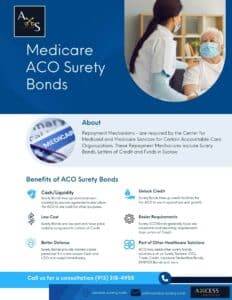Accountable Care Organizations (ACO) under Medicare’s Shared Savings Program must post a repayment mechanism showing that they can repay Centers for Medicare and Medicaid Services (CMS) for any losses they may occur during a performance period. As the interest rates and inflation continue to increase rapidly, this may be the time for ACOs to consider repayment mechanisms with better terms such as an ACO Bond.
The CMS only accepts three types of repayment mechanisms under the program. These include:
These repayment mechanisms ensure that the ACO can pay its portion of any share losses to CMS. Each mechanism has both advantages and disadvantages.
Funds Held in Escrow are cash, money market securities, or treasury backed securities that are held for the benefit of CMS. CMS requires that these funds are unencumbered, meaning the ACO cannot use them for other borrowing or operating purposes. The ACO must fully fund the repayment liability upfront into an approved account.
Escrow has historically been a popular way for ACOs to fund their repayment liability. However, strong inflation should cause ACOs to look at other options. Interest and returns paid in these accounts will likely struggle to keep up with the declining value of the dollar. Additionally, these are funds that could be used in other business operations and expansion.
Another popular repayment mechanism is an Irrevocable Letter of Credit from an approved lending institution. Letters of Credit are generally easy to obtain for most ACOs and do not tie up the cash resources of escrow. They have been particularly attractive in the low interest rate environment of the last decade. ILOCs often have a combination of fees and interest rates, both which are sensitive to other rates that the lender pays.
Unfortunately for ACOs, interest rates have been increasing and likely will continue to do so as the Federal Reserve raises rates to combat inflation. In fact, ILOCs rates are usually tied to an index such as the Secured Overnight Financing Rate (SOFR), or London Interbank Offered Rate (LIBOR). These rates have increased substantially in the last 24 months. Rising rates means that the cost for these Letters of Credit will likely rise and make this the most expensive of the three allowable mechanisms.
Another factor in considering an Irrevocable Letter of Credit is that they usually reduce an ACO’s borrowing ability. The ACO may need to borrow additional money for capital improvements, or operations and these borrowings may be reduced by the amount of the Letter of Credit.
Surety Bond
The third repayment mechanism allowed is a surety bond. Surety bonds are advantageous in that they do not tie up an ACO’s cash or borrowing ability. Surety Bond Companies do not file security interests unless a claim takes place. This allows the ACO to use those funds for other investments or operations.
Additionally, surety bonds are not sensitive to rising interest rates. They have a stable cost that should save most ACOs money as interest rates increase. Surety bonds are also easily obtainable for most ACOs.
The cost of a Medicare ACO Bond depends on the financial strength of the ACO being bonded. However, most ACOs can expect to pay about 1% of the bond amount for each year that the bond is in force. You can learn more about surety bonds costs here.
An ACO Bond will require the ACO to submit financial statements on the organization. Depending on the ACO’s financial strength, the individual owners of the ACO may also need to submit personal financial statements. However, this is rare for most ACOs.
The ACO is referred to as the principal on the surety bond. The ACO pays a third-party bond company to provide the bond and agrees to indemnify the bond company for any claims paid. The bond company then provides a financial guarantee to CMS that the ACO will pay any monies owed under the Shared Savings Program.
If a claim does occur, the surety bond company will be required to pay CMS and then they will seek to be reimbursed from the ACO.
All three CMS approved repayment instruments are solid options for ACOs. However, as inflation and interest rates increase, ACOs should reevaluate the different repayment mechanisms as an easy way to save money and free up resources. Contact the bond experts at Axcess Surety to learn how to obtain a Medicare ACO Bond.

Axcess Surety is the premier provider of surety bonds nationally. We work individuals and businesses across the country to provide the best surety bond programs at the best price.